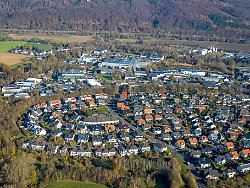Thursday, November 25, 2021
Risks increase
Bundesbank worried about property prices
Residential property prices are rising. The Bundesbank is watching the development with concern. She warns that the consequences of corrections could be underestimated. The many long-term loans made the system vulnerable to risk.
The Bundesbank warns of increasing dangers on the German housing market. In 2020 the prices for residential real estate rose sharply again with an average of 6.7 percent and a further increase is expected in many cases, it said in its report on financial stability. The prices of residential real estate are now 10 to 30 percent above the justified level. “This is increasingly the case outside of the metropolitan areas,” said Bundesbank Vice President Claudia Buch. The effects of price adjustments could be underestimated. “Now is the right time to prevent future risks,” she urged.
From the Bundesbank’s point of view, rising real estate prices can become critical for financial stability if more loans are granted with greatly relaxed lending standards and prices are expected to continue to rise. In the event of a price correction, more credit could come under pressure. According to a survey, almost 90 percent of households are expecting real estate prices to continue to rise.
According to the Bundesbank, a high proportion of long-term loans and investments makes the financial system vulnerable to risks that arise from a change in interest rates. Around half of the bank loans for residential property have a fixed interest period of more than ten years.
According to KfW chief economist Fritzi Köhler-Geib, the Bundesbank report shows that developments in the housing market must be carefully monitored. “There is no place for alarmism, but caution is needed across Europe,” she noted. “The low interest rates can tempt investors looking for investment opportunities to take greater risks.”
The European Central Bank (ECB) also recently pointed out increasing risks in the housing market in its financial stability report. The risk of price corrections has increased, especially in residential property markets in countries where valuations were already elevated before the crisis.
Reminder to build up capital buffers
“The pandemic is not over, there are downside risks in the real economy,” said Bundesbank Deputy Chief Buch. Overall, however, according to Joachim Wuermeling, Bundesbank board member, the financial system is sufficiently resilient to be able to cope with weaker economic developments.
The German central bank sees the situation in Germany as it did two years ago before the pandemic. The economy is growing, loans are increasing, and there are high prices on the financial markets. The awareness of dangers is decreasing. In this situation, banks would have to operate solid risk management and ensure adequate capitalization.
Buch also pointed out that some European countries have already used the so-called countercyclical capital buffer again. This is an additional cushion of crisis demanded by banks, which serves to cushion possible economic downturns. “In Germany too, building up the countercyclical capital buffer should start again in good time,” she said.
The buffer was set to 0.0 percent due to the Corona crisis, after an increase to 0.25 percent was planned before the pandemic. The Dutch central bank has already announced that it will gradually increase the buffer from zero to two percent once the consequences of the crisis have been overcome.
